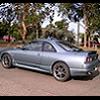Cracks In Exaust Manifold
Announcements
-
Similar Content
-
Latest Posts
-
Just get rid of the orignal low impedance injectors, replace with modern high impedance injectors, and you won't need the resistors. Wire direct, as per any other engine.
-
Tao, we're not talking about the ECU boost ref. We're talking about the wastegate signal source.
-
Flapping up and down is a consequence of the varying pull on the belt. When the engine speed is suddenly increased, the tension in the belt increases too. When that engine accel changes to decel, the tension is reduced and turns up as a little extra length of beltes between the pulling and dragging pulleys. That extra length flaps up, then down. There's all sorts of other harmonic stuff going on too.
-
By r33.antwone · Posted
hello ladies and gentlemen so i’ve swapped a rb26dett into my r33 gtst and ive come across many speed bumps but its nearly over what im having issues with is the injector resistor box that are normally on the RB26 fuse box but im still using my rb25 fuse box and as a result my injectors aren’t getting power and is the last thing i need to figure out so the car can start. can anyone help me out on where i can find a wiring diagram for the rb26 harness to see where the injectors are supposed to receive power -
The boost pressure at the compressor cover will be higher than at inlet manifold. lets say, trying to hold 20 psi flat at 7000 RPM. If your wastegate opens at 20 psi measured at the compressor cover, the engine may only be seeing 16 psi. Your base pressure reading at engine would be 20psi by 4K and 16psi by 7K while your MAP at compressor housing still reads 20psi at 7K. For this reason your ECU's MAP source is never on the compressor cover. This difference isn't a major concern if you're using an electronic boost controller (EBC).
-






Recommended Posts
Create an account or sign in to comment
You need to be a member in order to leave a comment
Create an account
Sign up for a new account in our community. It's easy!
Register a new accountSign in
Already have an account? Sign in here.
Sign In Now